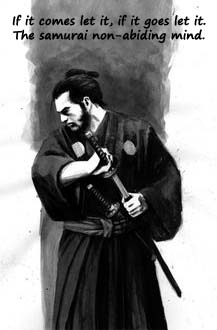 Every year my birthday falls on the autumn equinox. Autumn is the season associated with letting go which is sometimes sad to me. It is a little sad because there is so much hard change in the fall. In a blog post on the website alchemistrecovery.com someone wrote that autumn according to Chinese medicine is the "season of decline, release and ultimately death. It is the phase of the yearly cycle where we are encouraged, or forced to, let go of the things that are naturally coming to an end."
Being able to accept or just let something be, no matter what it is, is a corner stone of budo. Not being attached to something is what the Monk Takuan talked about as the "non-abiding mind" in his book The Unfettered Mind. The non-abiding mind does not discriminate - It only observes. This ability to just observe is what one might call mindfulness.
Every year my birthday falls on the autumn equinox. Autumn is the season associated with letting go which is sometimes sad to me. It is a little sad because there is so much hard change in the fall. In a blog post on the website alchemistrecovery.com someone wrote that autumn according to Chinese medicine is the "season of decline, release and ultimately death. It is the phase of the yearly cycle where we are encouraged, or forced to, let go of the things that are naturally coming to an end."
Being able to accept or just let something be, no matter what it is, is a corner stone of budo. Not being attached to something is what the Monk Takuan talked about as the "non-abiding mind" in his book The Unfettered Mind. The non-abiding mind does not discriminate - It only observes. This ability to just observe is what one might call mindfulness.
There is a saying associated with autumn, "If it comes, let it, if it goes let it." Yagyu Munenori said that the goal of training in swordsmanship was to overcome the six diseases parallels this ability to just observe things and let them go. The six diseases are: the desire for victory, the desire to rely on technical cunning, the desire to show off, the desire to psychologically overwhelm one's opponent, the desire to remain passive in order to wait for an opening and the desire to be free of all these diseases.
These diseases can be thought of as the stages of one's development in one's training.
If we let it come when it comes and if we let it go when it goes then we can be free of the diseases that Yagyu Munenori was warning us about.
